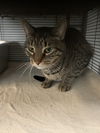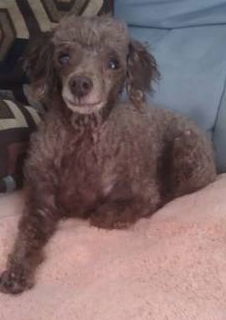
| My Rescue |
| Login to Remember your Favorite Animals and Breeds! |
Ester was found wandering the streets of Oviedo in terrible condition. Ester was matted and had some dental issues. She has since been completely shaved and is on medication for her skin. With regular baths and some TLC, this sweet little poodle should be looking good in no time. Ester also had a dental exam done as soon as we got her. She has since had all her teeth removed and her gums cleaned. This girl still loves to eat but must eat soft food only!
Foster update: Ester is good with dogs and cats. She seems to be very independent until she knows you, then becomes your velcro dog. She loves to sleep on the bed and cuddle with other dogs. She is housebroken and is pretty active for her age!
I've posted some pictures of Ester before she was groomed and then ones after. It's a bit of a difference. Once her hair grows out a bit, I know she will be so cute!
Ester qualifies for a Senior for Senior discount. If adopted by a senior person (55+) her adoption fee is only $50.
According to www.dogbreedinfo.com, although the Poodle has been known throughout Western Europe for at least 400 years, its origin is controversial. Whether it was developed in France, Germany, Denmark, or the ancient Piedmont is uncertain. Despite the claims of several other countries, France has now been officially recognized as its country of origin, and the breed occupies a special place in the affections of the French. It is certain that the Poodle is descended from a now nearly extinct French water dog, the Barbet and possibly the Hungarian Water Hound. The name "Poodle" probably derives from the German word "Pudel," which means one who plays in water. The Poodle was used as a gun dog and originally was used in Germany and France as a retriever of waterfowl. Hunters clipped the dog's thick coat to help him swim, leaving hair on the leg joints to protect them from extreme cold and sharp reeds. The French capitalized on the breed's high intelligence, trainability, and innate showmanship, and made the Poodle into a circus performer. His great popularity in that country led to the breed's common name "French Poodle." In France, however, the Poodle was called the "Caniche," or duck dog. The Poodle has been used to sniff out truffles lying underground in the woods. Poodles are depicted in 15th century paintings and in bas-reliefs from the 1st century. Toy Poodles became royal favorites, particularly in the 18th century. The Toy and Miniature Poodle varieties were bred down from larger dogs, today known as Standard Poodles. The three sizes are considered one breed and are judged by the same standard. Today, the Poodle is primarily a companion and show dog, though he can learn almost anything. Some of the Miniature Poodle's talents include: retrieving, agility, watchdogging, competitive obedience, and performing tricks. The Miniature Poodle is a cheerful, super smart, sensitive and highly trainable companion dog. The breed is great at learning tricks, and a favorite in the circus ring. The Poodle will feel slighted if it is left out of family activities. He is very amusing and clever. Many owners feel this dog understands speech in an uncanny way. Some love to play with children, but some are sensitive and nervous. They can be somewhat high-strung. Be careful where you buy your puppy. Purchase from parents you have met and liked, and even ask to see the grandparents if possible. They tend to be quite reserved with strangers and should be socialized as a puppy. Any effort the owner puts into training and socializing will be well rewarded. This is a very good watchdog for its size, seldom becoming aggressive. They do tend to bark a lot. Poodles are friendly with other dogs and non-canine pets. They have a life-expectancy of 12-15 years.
Other Pictures of Ester the Sweet Little Poodle (click to see larger version):
 36.5k |
 27.7k |
 32.4k |
 46.5k |
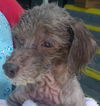 164.3k |
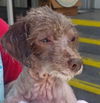 132.2k |
 142.8k |
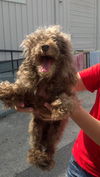 64.2k |
 48.1k |
 59.3k |
Copyright © Pet Rescue by Judy
